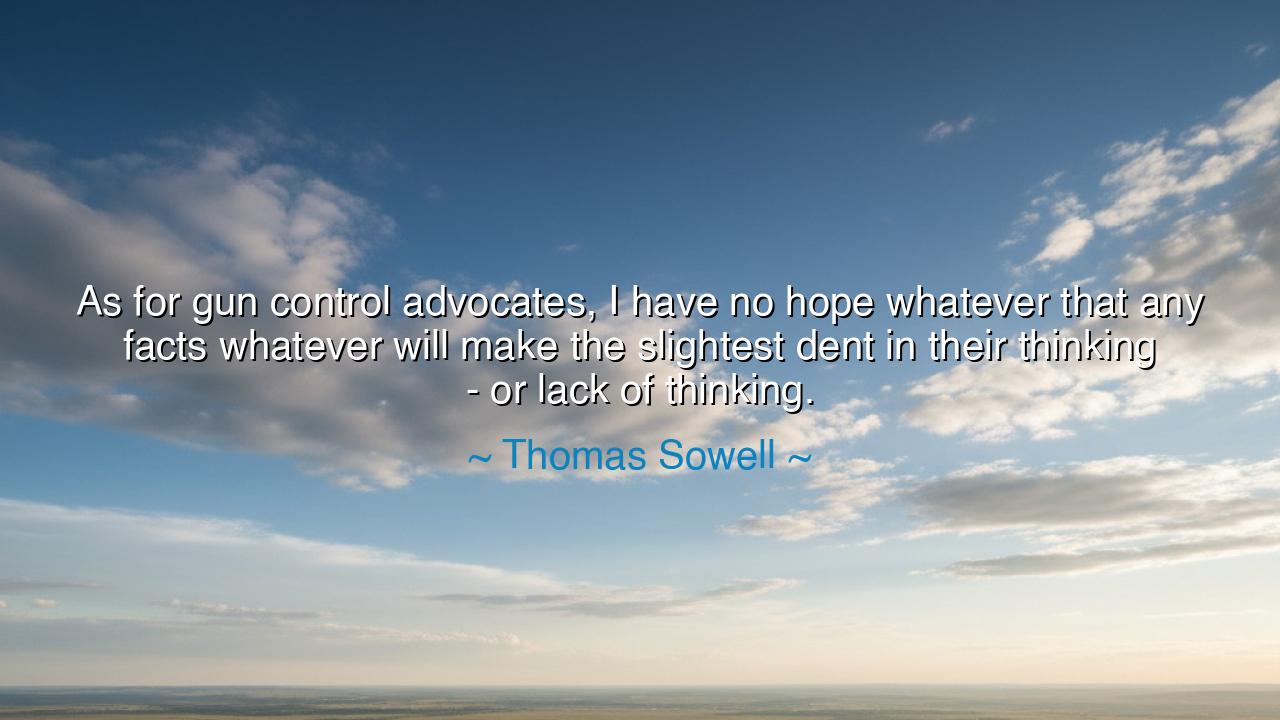
As for gun control advocates, I have no hope whatever that any
As for gun control advocates, I have no hope whatever that any facts whatever will make the slightest dent in their thinking - or lack of thinking.






“As for gun control advocates, I have no hope whatever that any facts whatever will make the slightest dent in their thinking — or lack of thinking.” — Thomas Sowell
In this sharp and fiery declaration, Thomas Sowell, the renowned economist and philosopher, speaks not merely of the issue of gun control, but of a larger and deeper sickness that plagues human discourse — the refusal to think. When he says, “I have no hope whatever that any facts will make the slightest dent,” he is lamenting a world where emotion reigns over reason, and conviction blinds the eyes of understanding. His words, though stern, are not born of arrogance but of sorrow — the sorrow of one who has devoted his life to truth, yet has seen truth repeatedly drowned beneath the tides of ideology.
To grasp the meaning of this quote, one must understand the mind of Thomas Sowell, a scholar who rose from poverty to become one of the most respected voices in economics, history, and social thought. His life was built upon the discipline of reason — the belief that facts, logic, and evidence must guide human judgment. Yet through long decades of study and debate, he came to see that many do not seek truth, but comfort. They cling to ideas not because they are right, but because they are familiar. Thus, his words are not merely about gun control; they are about the tragedy of the unthinking mind, the person who would rather feel righteous than be right.
The ancients, too, warned of this danger. Plato, in his dialogues, spoke of the cave where men mistake shadows for reality, and of the philosopher who, upon seeing the light, is met not with gratitude but with hostility. Sowell’s lament belongs to the same lineage — the eternal conflict between reason and illusion, between those who think and those who refuse to. He recognizes that once a person’s beliefs become sacred, even the purest fact becomes an enemy. To argue with such a person is to strike at faith, not ignorance. And as every sage has learned, no fact, however radiant, can penetrate a heart armored with ideology.
Yet this is not a call to despair, but a warning. The unthinking mind is not confined to one cause or creed; it exists in all who let pride silence inquiry. History overflows with examples of civilizations that perished because their people would not face truth. The fall of Athens, the collapse of Rome, the madness of revolutions — all were born from the same flaw: the substitution of passion for thought. Once the cry of emotion drowns the voice of reason, even the wisest laws crumble, and destruction follows. Sowell’s words remind us that reason is not a luxury, but the foundation upon which all freedom and justice rest.
There is a story from the days of Galileo, who dared to say that the Earth revolved around the sun. He had facts, he had evidence, yet his accusers would not look through his telescope. They feared not the truth itself, but what it might do to their cherished certainties. Sowell’s lament mirrors that moment: that even in an age of enlightenment, the greatest obstacle to truth is not ignorance, but the illusion of knowledge. Those who will not think, who will not listen, cannot be taught — and it is this blindness, not mere disagreement, that he mourns.
Still, there is a glimmer of wisdom in his despair. For though he claims to have “no hope,” his very act of speaking truth is itself an act of hope. Every word he wrote, every argument he made, was a seed cast upon stony ground — perhaps few would take root, but he sowed them nonetheless. In this, Sowell teaches us the virtue of intellectual courage: to stand by truth even when it seems no one hears, to defend reason even when emotion rules. The wise must not be silenced by the stubbornness of the crowd, for the crowd is often the first to destroy what it does not understand.
Lesson:
From Thomas Sowell’s fierce words, we learn that truth demands both patience and courage. Never surrender the discipline of thought to the comfort of feeling. Listen, question, and reason even when it is unpopular to do so. Do not argue merely to win, but to understand. For the world is filled with noise, but wisdom is born in silence — the silence of reflection, the stillness before judgment. Sowell’s warning is timeless: facts are powerless before closed minds, but powerful in the hands of those who dare to think. Therefore, cultivate the mind that listens, the heart that seeks, and the will that stands firm in truth — even when the world around you will not.






AAdministratorAdministrator
Welcome, honored guests. Please leave a comment, we will respond soon